News & Events
Transnational Care Book Club
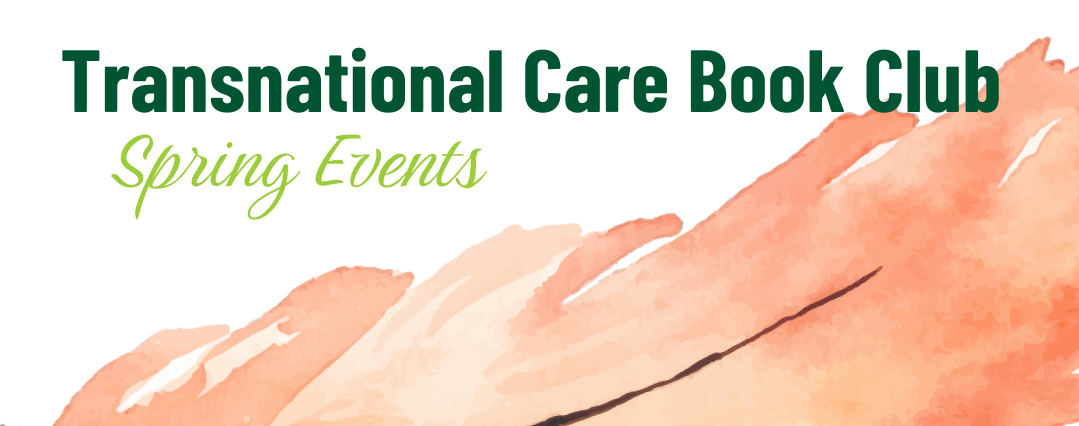
Join us for a thought-provoking series of events as part of the “Transnational Care” book club. Through literature, film, and discussion, we’ll explore how care and solidarity intersect with the complexities of local and global communities. This unique series brings together diverse perspectives, bridging geographies and histories to address pressing challenges of community and connection.
Project curator - Dr. Tatsiana Shchurko.
Sponsored by the USF Department of Women’s, Gender, and Sexuality Studies; USF Department of Humanities & Cultural Studies; USF Institute for Russian, European and Eurasian Studies; and the USF Humanities Institute.
Schedule of Events
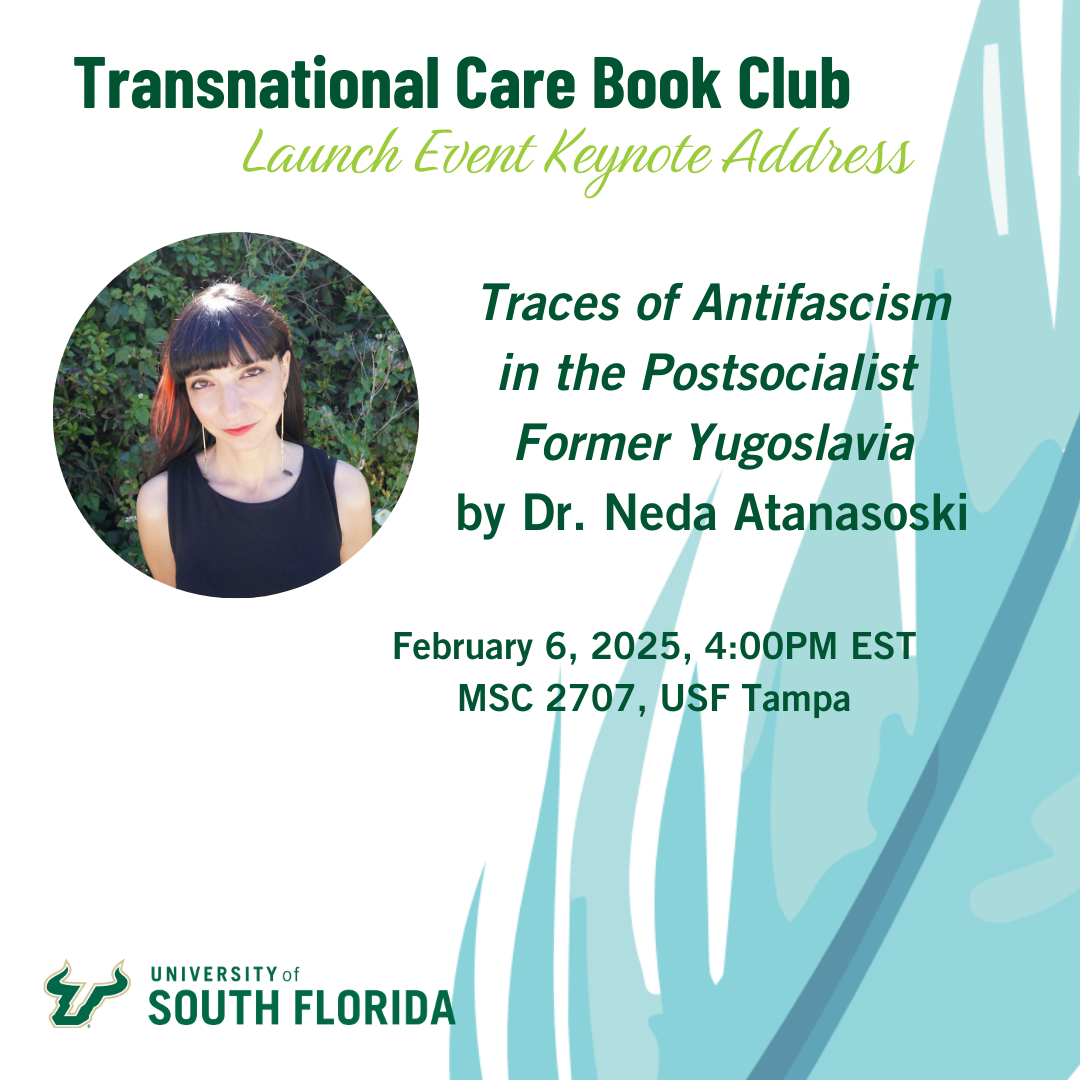
February 6, 2025, 4:00PM EST, MSC 2707
Launch Event: Keynote Address by Dr. Neda Atanasoski: “Traces of Antifascism in the
Postsocialist Former Yugoslavia”
Dr. Atanasoski, Chair of the Harriet Tubman Department of Women, Gender, and Sexuality Studies at the University of Maryland, will present a keynote address on “Traces of Antifascism in the Postsocialist Former Yugoslavia.” Drawing on her expertise in the intersections of gender, technology, and global politics, this talk will set the stage for the book club’s journey into questions of care, solidarity, and resistance. This talk will explore how cultural texts revisiting the 1990s Yugoslav wars challenge dominant narratives, recover erased histories of nonalignment and antifascist worker self-management, and illuminate the contemporary global rise of fascism.
Keynote description and speaker bio
The wars of secession of the 1990s in the former Yugoslavia are generally apprehended as ethnonationalism gone awry, and their aftermath as one of liberal capitalist democracy bringing law and order to the Balkan region. In this talk, I focus on cultural texts, including performance, film, and fiction, that recall the 1990s war in a different light, bringing to the fore submerged histories of nonalignment that resurface affinities across parts of the second and third worlds that were invisibilized and absorbed into a newly emerging international capitalist order at the Cold War’s end. These texts return to antifascist ethos of Yugoslav worker self-management to foreground a politics that has been largely erased or vilified in recent years. Doing so, I argue, these works shed new insight into the contemporary global rise of fascism.
Dr. Neda Atanasoski is Professor and Chair of the Harriet Tubman Department of Women,
Gender and Sexuality Studies at the University of Maryland, College Park and Associate
Director of Education for the Artificial Intelligence Interdisciplinary Institute
at Maryland (AIM). Atanasoski’s interdisciplinary research has focused on feminism
and AI, feminist and critical race approaches to science and technology studies, AI
and the future of work, militarism, and human rights and humanitarianism. She is the
author of Humanitarian Violence: The U.S. Deployment of Diversity (2013), co-author of Surrogate Humanity: Race, Robots, and the Politics of Technological Futures (2019), and co-editor of Postsocialist Politics and the Ends of Revolution (2022) and Technocreep and the Politics of Things Not Seen (2025). She was the editor of the journal Critical Ethnic Studies, the flagship journal of the Critical Ethnic Studies Association, from 2018-2024.
Prior to UMD, Atanasoski was professor of Feminist Studies and founding co-director
of the Center for Racial Justice at the University of California, Santa Cruz.
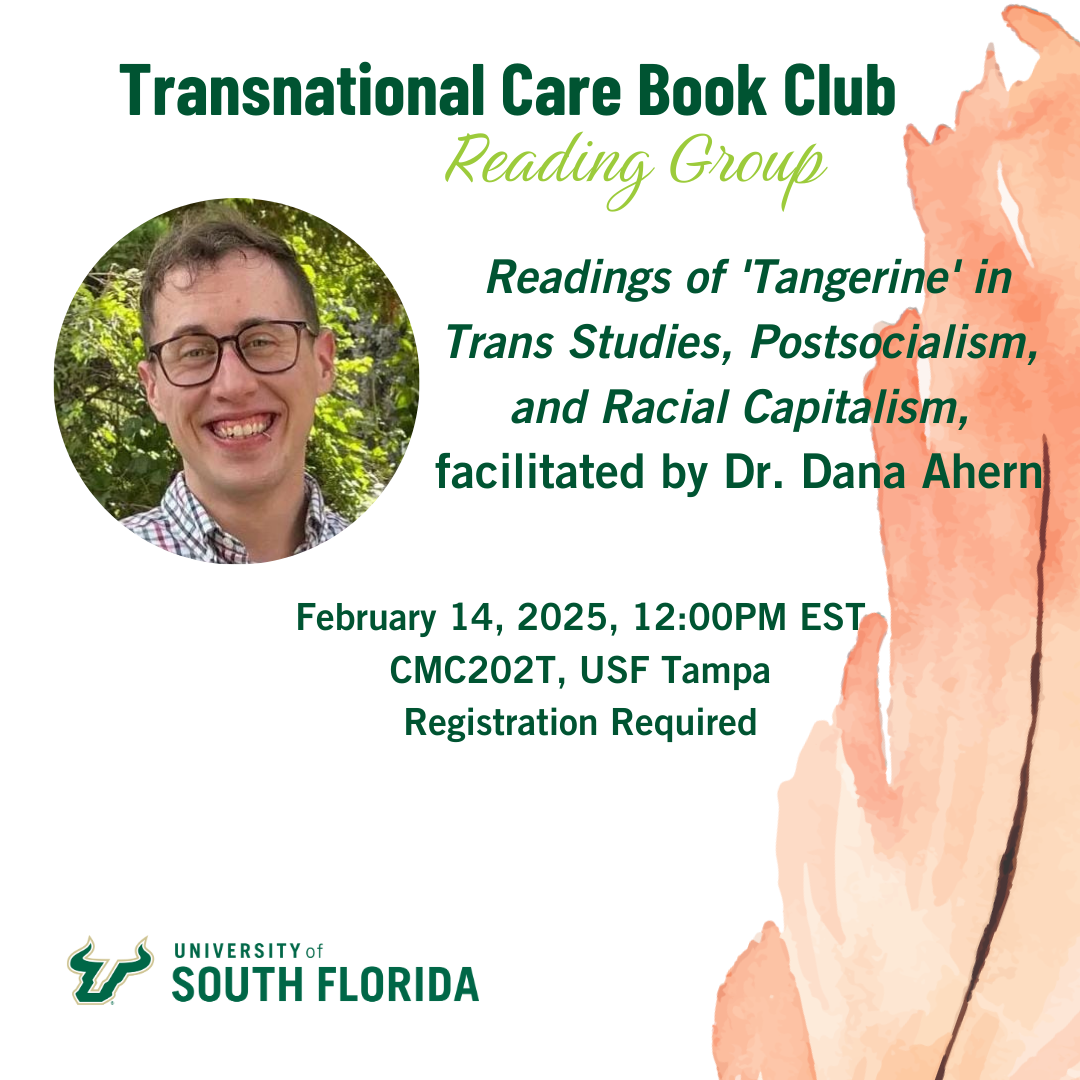
February 14, 2025, 12:00–2:00PM EST, CMC 202T
Reading Group: “Readings of 'Tangerine' in Trans Studies, Postsocialism, and Racial
Capitalism,” facilitated by Dr. Dana Ahern
Join our reading group to explore the intersections of Black trans politics in the U.S., Cold War legacies, and migrant identities in a thought-provoking discussion. Together, we’ll dive into Bogdan Popa’s article, “Trans and Legacies of Socialism: Reading Queer Postsocialism in Tangerine,” which examines queer postsocialist temporality and the connections between trans/queer politics and anti-racial capitalist movements. Guiding this insightful conversation will be Dr. Dana Ahern, Assistant Professor of Women’s, Gender, and Sexuality Studies at USF. Don’t miss this opportunity to engage with compelling ideas and connect with fellow thinkers!
Please register to receive reading materials for this event. Click here for more information about the film Tangerine.
Light refreshments will be provided.
Facilitator bio
Dr. Dana Ahern is an Assistant Professor of Women’s, Gender, and Sexuality Studies at USF. Ahern’s research primarily utilizes digital archives and oral histories to explore the technological development and utilization of transgender medicine over the past century, particularly between and across the United States and Eastern Europe. Prior to joining USF, Ahern completed a postdoctoral fellowship at the University of Nevada, Reno in the Department of Gender, Race, and Identity where he taught classes in queer and trans studies. Ahern’s teaching and research interests primarily revolve around intersections of queer and trans studies, disability studies, and feminist science and technology studies.
Register for "Readings of Tangerine"
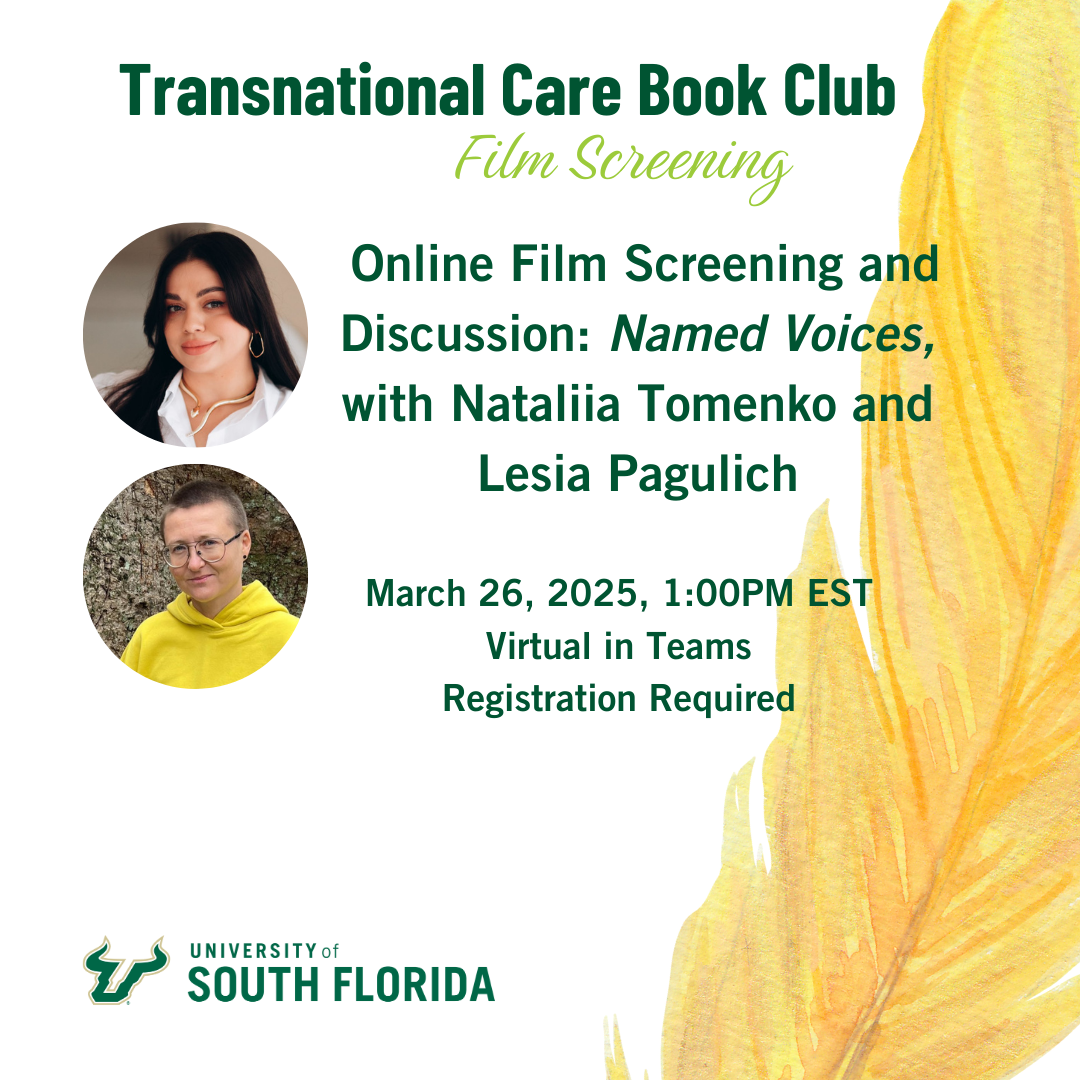
March 26, 2025, 1:00–3:00PM EST, via Teams
Online Film Screening and Discussion: Named Voices
This compelling documentary theater play, Named Voices, examines the German Nazi genocide of Roma in Ukraine during the 1940s and the ongoing experiences of Roma communities under Russia’s current war against Ukraine. The film interweaves stories of Roma people affected by WWII, connecting their past and present struggles. Produced by the Agency for the Advocacy of Roma Culture ARCA in collaboration with the Inclusive Theatre Association ART-PLAYBACK, the film draws upon ARCA's archives and interviews with Roma provided by the Ukrainian Center for Holocaust Studies. Following the screening, join Nataliia Tomenko, Roma activist and cultural heritage expert, and Lesia Pagulich, Ukrainian queer studies scholar, for a conversation on how histories of violence shape new understandings of care, solidarity, and healing. The film is in Ukrainian with English subtitles (78 min).
Please register to receive the link.
Discussion facilitators bios
Nataliia Tomenko is a visual artist, curator, cultural heritage expert, and Roma human rights activist from Ukraine. She completed her MA in Cultural Heritage Studies: Academic Research, Policy, and Management at Central European University in Vienna, Austria. Additionally, she holds an MA in Graphic Design from the Kharkiv State Academy of Design and Arts. Currently, she is a Deputy Director at the ARCA: Agency for the Advocacy of Roma Culture in Ukraine. Also, she is a coordinator of the History and Commemoration section at the ERIAC: European Roma Institute for Arts and Culture in Berlin. Nataliia combines her artistic production with research, in particular, her study topic is "Safeguarding of Roma Cultural Heritage in Ukraine During the War," which was developed within a fellow research position at the Forschungsstelle Antiziganismus at Heidelberg University. Meanwhile, she contributes to documenting the active participation of Roma in the civil movement and promotes Roma rights in a diversity of cultural expression.
Lesia Pagulich is a queer feminist researcher from Ukraine. She holds a PhD in Women’s, Gender and Sexuality Studies from the Ohio State University and has recently completed a postdoctoral fellowship at the University of Vienna, Austria. Her research interests lie in the fields of critical race, queer, feminist, and postsocialist studies.
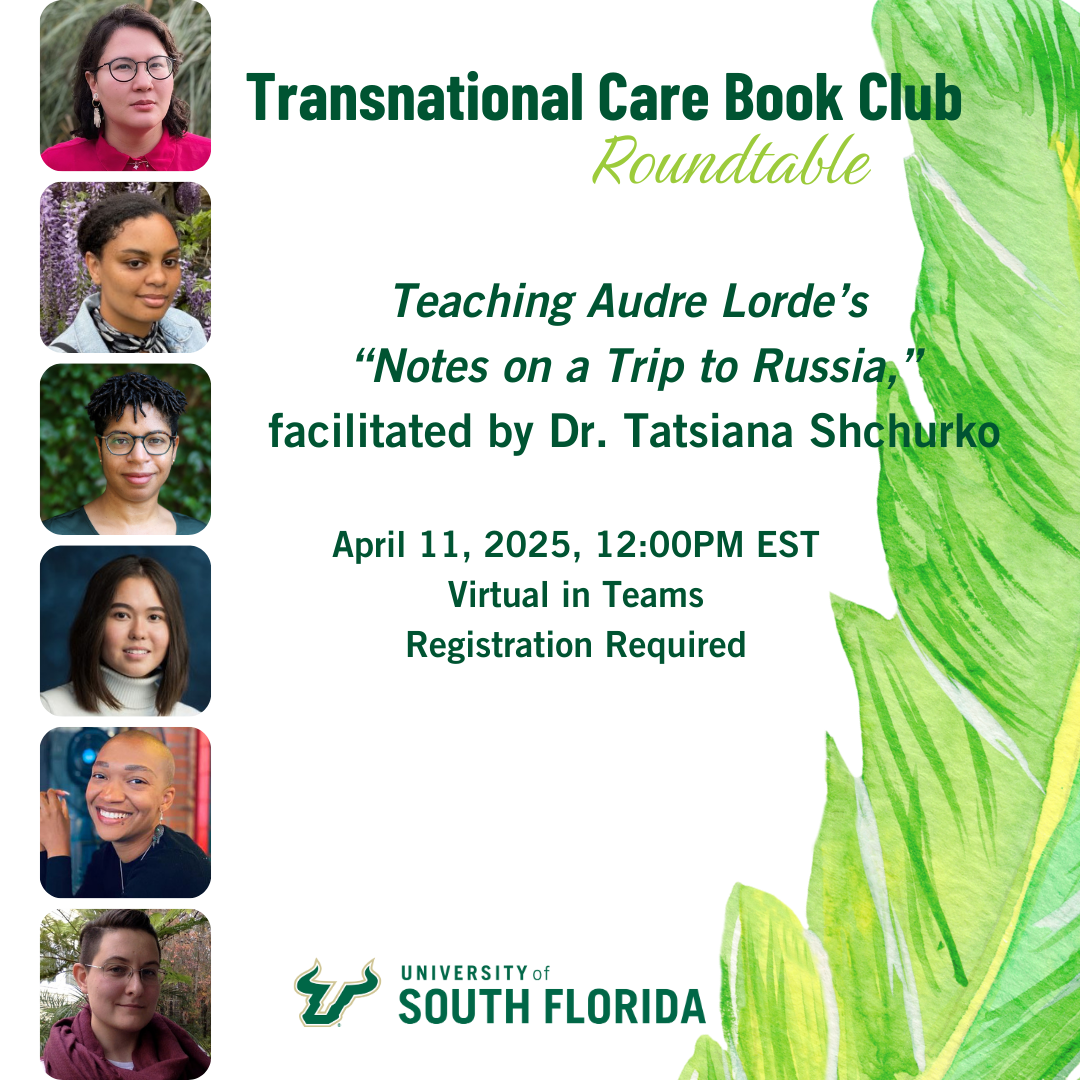
April 11, 2025, 12:00–2:00PM EST, via Teams
Teaching-Oriented Roundtable: “Teaching Audre Lorde’s ‘Notes on a Trip to Russia,’”
facilitated by Dr. Tatsiana Shchurko
This roundtable will explore Audre Lorde’s essay from Sister Outsider, focusing on its relevance to Black-Indigenous Eurasian solidarities and the insights it offers for today’s classrooms. In 1976, the renowned Black feminist writer and activist Audre Lorde traveled to Soviet Eurasia, yet her essay on this journey has received surprisingly little attention. Why has this essay been largely overlooked, and what value does it hold for the contemporary moment? Should we teach this essay, and if so, how? Join us as we delve into these questions and consider the significance of Lorde’s reflections for fostering dialogue and understanding in our interconnected world.
Please register to receive the Teams link.
Panelists include:
- Azhar Dyussekenova (PhD Сandidate, Department of Slavic Languages and Literatures, the University of Michigan) specializes in 20th- and 21st-century Russophone literature, with particular attention to postcolonial ecocriticism and queer-feminist writing in non-Russian contexts.
- Alexa Kurmanov (Ph.D. Candidate, Anthropology, University of California, Berkeley), whose dissertation examines LGBT and feminist activism in (post)socialist Kyrgyzstan.
- Mae A. Miller-Likhethe (PhD, Assistant Professor of Global Studies at the University of California, Santa Barbara) engages in her work transnational social movements, cultural histories of infrastructure and empire, Black feminist thought and activism, and oceanic humanities.
- Saltanat Shoshanova (doctoral researcher, the University of Regensburg) focuses on queer feminist art, decoloniality, and memory production in Central Asia.
- Jamele Watkins (PhD, Assistant Professor, German Studies, University of Minnesota), whose research includes Black performance, race, and gender in Germany.
Dr. Tatsiana Shchurko, Assistant Professor of Instruction, Women’s, Gender, and Sexuality Studies at USF, will facilitate this rich discussion. She is a queer feminist researcher from Belarus specializing in transnational feminist theorizing. She holds a PhD from The Ohio State University, where she also held a postdoctoral ACLS Fellowship. Her book project investigates the relationship between U.S. Black feminist Internationalism and Eurasian knowledge production.
Full panelists bios
Azhar Dyussekenova is a PhD candidate in the Department of Slavic Languages and Literatures at the University of Michigan. She specializes in 20th- and 21st-century Russophone literature, with particular attention to postcolonial ecocriticism and queer-feminist writing in non-Russian contexts.
Alexa Kurmanov is a doctoral candidate in the Anthropology Department at the University of California, Berkeley. Their dissertation, Queer Nomads: The Politics of LGBT and Feminist Movements in (Post)socialist Kyrgyzstan, examines LGBT and feminist activism in Kyrgyzstan through the frameworks of Black feminist theorizations of intersectionality and critical Black ethnography. Kurmanov explores how state and public discourse reconstruct the category of “woman” in (post)socialist Kyrgyzstan and how this category intersects with issues of class, race, and space. Their work also investigates how local LGBT and feminist communities navigate, contest, and rearticulate notions of gender and sexuality in everyday life.
Mae A. Miller-Likhethe is an interdisciplinary scholar, curator, and educator. Her work broadly engages transnational social movements, cultural histories of infrastructure and empire, Black feminist thought and activism, and oceanic humanities. She is currently an Assistant Professor of Global Studies at the University of California, Santa Barbara, where she is working on her first book manuscript, Oceanic Groundings: Political Education and Place-Making on the Interwar Waterfront. She completed her Ph.D. in Earth and Environmental Sciences (Geography) from the City University of New York, Graduate Center in 2020, and held a President’s Postdoctoral Fellowship in the Geography Department at UC Berkeley from 2020-2022. Her scholarly writings have appeared in Radical History Review, Urban Geography, and Dialogues in Human Geography. She has curated contemporary art exhibitions at VisArts (Washington, D.C. metro area), Apexart (New York City), and EFA Project Space (New York City) related to Black geographies, decolonial ecologies, and oceanic epistemologies.
Saltanat Shoshanova is a doctoral researcher at the University of Regensburg, focusing on queer feminist art, decoloniality, and memory production in Central Asia. Her doctoral research, conducted as part of the project titled “Light On! Queer Literary Cultures under Socialism,” explores queer art and culture in Central Asia. She is the co-editor of Queer-Feminist Solidarity and the East/West Divide (Peter Lang, 2019), and has published articles appearing in the Central Asian Survey and History & Memory.
Jamele Watkins researches the intersection of race and gender in the German speaking world. Her current book project, Roses for Angela, focuses on Angela Davis in the GDR. Her other articles cover Black hair in Germany, Black performance, and rap. As an assistant professor in German Studies at University of Minnesota, she teaches everything from the premodern to the present. Watkins received a degree in German Studies from University of Massachusetts Amherst.
Register for "Notes on a Trip to Russia"